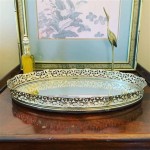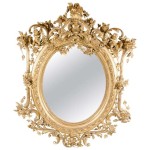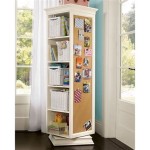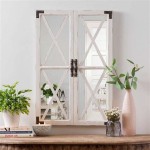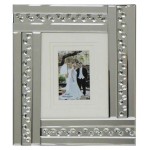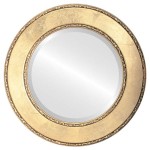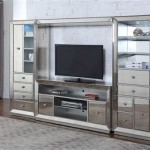What Size Mirror for Living Room?
Mirrors are a versatile and stylish addition to any living room, capable of enhancing the space's aesthetic appeal, functionality, and overall atmosphere. Determining the appropriate size for a living room mirror, however, can be a challenging task, requiring careful consideration of various factors to ensure a harmonious and visually appealing integration into the existing décor. This article provides a comprehensive guide to help you select the perfect mirror size for your living room.
Factors to Consider When Choosing Mirror Size
Before embarking on the journey of mirror selection, it is essential to consider various factors that will influence the optimal size. Understanding these factors will allow you to narrow down your options and make an informed decision.
1. Room Size
The size of your living room plays a crucial role in determining the appropriate mirror size. A larger mirror will generally work best in spacious living rooms, while smaller mirrors are better suited for smaller spaces. Aim for a mirror that is about one-third to one-half the width of the furniture it will be placed near. For instance, a large sofa might necessitate a mirror that spans 40-60 inches in width. A small living room, on the other hand, might be best adorned with a mirror that measures 24-36 inches in width.
2. Furniture Placement
The placement of furniture in the living room is another important factor to consider. Mirrors should be placed strategically to enhance the flow of the space and create a visually appealing arrangement. They can be positioned above a fireplace, mantel, sofa, or console table, but avoid overcrowding or obstructing the view of other key features. Consider how the mirror will reflect the room and the objects within it.
3. Wall Space
Ensure there is ample wall space available to accommodate the desired mirror size. Too small a mirror may appear lost in a large space, while a large mirror in a cramped space might feel overwhelming and claustrophobic. It's generally recommended to leave at least 6-12 inches of space between the edges of the mirror and the surrounding walls.
4. Style of the Mirror
The style of the mirror can also influence the size selection. Smaller, delicate mirrors with intricate frames are often best for smaller spaces and traditional styles, while larger, bolder mirrors with simple frames may be more suitable for modern and contemporary settings.
Guidelines for Choosing Mirror Size
While individual preferences and room layouts vary, following some general guidelines can help simplify the mirror selection process. These guidelines serve as starting points and should be adapted to individual circumstances.
1. Above a Fireplace
When selecting a mirror for placement above a fireplace, consider the size of the mantel and surrounding wall space. The mirror should be about 2/3 to 3/4 the width of the mantel, leaving sufficient space around the sides. Additionally, the mirror should be high enough to avoid blocking the view of the fire.
2. Above a Console Table
Mirrors placed above a console table should be approximately 2/3 to 3/4 the width of the table. Aim for a distance of 6-12 inches between the top of the table and the bottom of the mirror. This creates a balanced and proportionate arrangement.
3. Over a Sofa
For a mirror placement above a sofa, the ideal size is about 2/3 to 3/4 the width of the sofa. Alternatively, consider a mirror that extends the full width of the sofa. When positioning the mirror, ensure adequate space between the top of the sofa and the bottom of the mirror, typically 6-12 inches.
Maximizing the Impact of Mirrors
Mirrors possess the ability to transform a space beyond just visual appeal. By strategically placing them, you can create a sense of depth, expand the perceived size of the room, and enhance natural light. Experiment with various mirror placements to achieve the desired effect.
1. Reflecting Light
Mirrors can reflect natural light, illuminating dark corners and creating a brighter, more welcoming atmosphere. Placing a mirror opposite a window can amplify the natural light and create a sense of openness.
2. Expanding Space
Mirrors can make a room appear larger by reflecting the space and creating a sense of visual continuity. Placing a large mirror on a wall opposite a window can create the illusion of a larger space by reflecting the view outside.
3. Creating Focal Points
Mirrors can be used to draw attention to a specific area in the room. Placing a mirror behind a piece of furniture can create a focal point and draw the eye towards that area.
Remember that selecting the right size mirror for your living room involves a combination of personal style, room dimensions, and the desired impact on the overall aesthetic. Consider these guidelines as a starting point and adjust them based on your individual needs and preferences. With careful planning and consideration, you can create a living room that is both visually appealing and functionally optimized.

How To Pick The Right Size Mirror Antique Glass Ltd

Want To See Your Entire Outfit The Best Full Length Floor Mirrors And How Style Them Emily Henderson

9 Full Length Mirrors To Make A Small Space Look Larger And In Style Real Homes
:strip_icc()/rsw_2320h_1740-d25666e158074d5abe9855175e9e1919.jpg?strip=all)
20 Breathtaking Living Room Mirror Ideas To Try

How To Choose The Right Decorative Mirror

Living Room Mirror Wall Mirrors For Neutypechic

Choosing The Best Mirror Sizes For Your Home

Full Length Mirror Large Rectangle Size For Bedroom Living Room Floor With Frame China Dressing Made In Com

Living Room Mirror Wall Mirrors For Neutypechic

Best Tips For Choosing The Mirror Your Room Ridge Times

